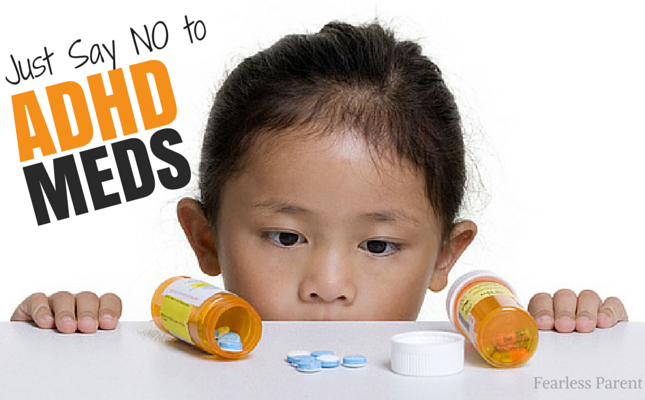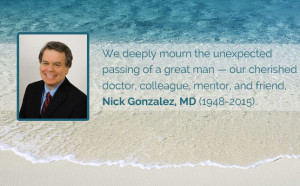This is Part 1 in a two part series that explores pragmatic steps for parents saying no to ADHD meds as a first-line response (read Part 2 here).
When a child receives a diagnosis of ADHD, it’s hard for parents to deal with the emotional repercussions, let alone sort out the mass of information. There is one message, however, that will be coming through loud and clear from almost everyone parents are likely to consult — doctors, teachers, psychiatrists, and practitioners — and that’s:
To medicate or not medicate is the big question
An ADHD diagnosis is particularly prone to this knee-jerk response from professionals who are so convinced these children have a genetic disorder that they have called off the search for a better understanding of the underlying conditions. Our society has become conditioned to trust the physicians and jump to a pill for the ‘quick fix.’
Of course, conventional medicine is a powerful tool, and certainly the best place to start if you have a broken leg or a heart attack. But it falls short against a more nuanced disorder like ADHD. Parents will be told that ADHD is complex in nature, possibly a result of genetic, psychological, and other unknown factors. In general, however, allopathic doctors do not address the wide range of physical symptoms often shared by kids with this disorder, such as:
As a psychotherapist who has worked for over a decade in mainstream medicine, I empathize with parents seeking a quick fix. However, I feel it is important for parents to look not only at evidence-based treatments, but also to consider the results that parents are seeing with holistic approaches and dietary changes.
What you won’t hear from a conventional doctor
Your child is probably suffering from genetic mutations and a nutritional deficiency combined with a food sensitivity.
Genetically modified foods, food dyes and preservatives, and chemicals are having an adverse reaction on your child’s attention, focus, and sleep.
For every medication, there is a natural plant or remedy that can achieve the same result without side effects.
Our emotions are largely governed by our intestinal system. There is more serotonin in our bowels than in our brains.
Bear in mind
Every child is unique. A well thought out integrative treatment plan needs to be tailored to each child’s specific immunologic, digestive, and metabolic conditions. Find physicians and practitioners who will listen to you and conduct a thorough investigation. You will most likely need a team or different practitioners.
Changes can take time. Move slowly but steadily with dietary changes and protocols.
Treatment can be expensive. You are not letting your child down if you can’t afford the most expensive therapies. Check with special needs associations about the Department of Education services, government subsidies, financial aid, and therapists who provide sliding scales. You may also have to make lifestyle changes.
Focus on love, patience, and hard work. Know that the most important therapy takes place at home.
Trust your gut! You know your child best. Your intuition is the best guide.
Important first steps
Look for a qualified naturopath or integrative MD in your area who specializes in ADHD and related disorders. Google Naturopathic (ND), Defeat Autism Now (DAN), Medical Academy of Pediatric Special Needs (MAPS) physician, Functional Medicine, or Integrative Medical Doctor (MD) practitioners in your area.
Do your research. Have a list of questions for your selected doctor. Ask for a complete metabolic workup including blood, urine and fecal testing. Also request a food sensitivity test (IgG) or ALCAT, Organic Acids Test to determine nutritional deficiencies.
Read! Good books include: Healing without Hurting, Almost Autism, A Compromised Generation, Healing the New Childhood Epidemics, and All Natural Mom’s Guide to the Feingold Diet.
Continue with mainstream therapies like OT and PT, behavioral plans, and psychotherapy. Also investigate other modalities such as acupuncture, craniosacral, brain balance therapies, and so on. Biomedical treatment enhances the effects of other therapies.
Join parent support groups, which can be a great source of information and inspiration. If there isn’t one in your area, explore the many online forums and blogs.
***
Our children deserve a healing-oriented approach that considers the whole person — body, mind, and spirit. The best results come from tailor-made therapies, both conventional and alternative. Good medicine should be based on good science, be inquiry-driven, and be open to new paradigms. I urge parents to consider natural, effective interventions whenever possible. We need a system that promotes prevention of illness as well as a healthier treatment of disease.
Listen to “Reversing ADHD Without Meds” on Fearless Parent Radio™ with Jenn and host Beth Lambert.
Comment below and you might win a copy of Jenn’s new book Healing Without Hurting! Be sure to provide a valid e-mail address so we can contact you.
 Jennifer Giustra-Kozek, LPC, HpN is an author and licensed psychotherapist with 15 years of clinical experience treating clients with Asperger’s, depression, anxiety, OCD, and ADHD. Jennifer has seen this epidemic unfold in her own private practice and has watched the harmful impact of medication on many young clients. The ADHD epidemic turned personal when Jennifer’s young son was diagnosed. She plunged into the world of safe and natural healing modalities outside of the pharmaceutical model. Jennifer wrote about her son’s recovery from ADHD and apraxia in her new book Healing Without Hurting. She consults and blogs with thousands of moms through social media to teach them about alternative and natural solutions.
Jennifer Giustra-Kozek, LPC, HpN is an author and licensed psychotherapist with 15 years of clinical experience treating clients with Asperger’s, depression, anxiety, OCD, and ADHD. Jennifer has seen this epidemic unfold in her own private practice and has watched the harmful impact of medication on many young clients. The ADHD epidemic turned personal when Jennifer’s young son was diagnosed. She plunged into the world of safe and natural healing modalities outside of the pharmaceutical model. Jennifer wrote about her son’s recovery from ADHD and apraxia in her new book Healing Without Hurting. She consults and blogs with thousands of moms through social media to teach them about alternative and natural solutions.













I have one on Meds and one not, both have autism too, since my son has been on Meds we’ve educated ourselves and are desperate to get him off them in a safe and controlled way. Also I can find articles stating that artificial folic acid is harder for the body to turn into folates and that artificial folic acid may cause birth defects if taken during pregnancy. Also children with ADHD can’t break synthetic folic acid and heightens ADHD symptoms more.
Yes! Exacty and if we carry MTHFR gene mutation we may need more FOLATE.
My book can teach you how. Reviews and a sneak peak on Amazon.
My son was diagnosed when he was young and entering elementary school and he is currently medicated. I would love the opportunity to figure out how to manage and help him with out medication.
Thank you.
Hi Megan. I am here to help. You can find me on Facebook.I have poured out my heart and tons of research hours helping my son and my book is here to help you navigate a sea of treatment options. Always trust your gut and go with ones that feel right to you. ❤️
As a special education teacher with more than 20 years experience the issue that is often overlooked is vision. Although parents and schools will say the child has 20/20 vision there are many other factors that affect behavior and achievement. A thorough exam by a developmental/behavioral optometrist (not ophthalmologist who looks at disease and malfunction of the eye muscles) can expose issues with how the child ‘sees’ his environment. Vision therapy can make a world of difference for those children identified. In the school environment many children are found eligible for special education services as a student with a learning disability when the real problem is vision related for which schools are not equipped to address or correct. Please check out http://www.covd.org and http://www.eyecanlearn.com/ to learn more about vision issues that go undetected. Another site that is very helpful is http://www.visiontherapydc.com/ . Explore any of those sites for additional information on vision skills, deficits and therapies available . . . all of which are non-drug related and can be life changing for the child. There is actually a checklist for how vision issues and ADD/ADHD can appear similar. Because of that, ruling out a vision problem is imperative to identifying and treating the underlying cause of behavioral, developmental, and/or educational problems. The covd.org site has the ability to put in a zip code to identify developmental/behavioral optometrists in that locale.
Thanks for the opportunity to start a conversation on this. I agree with all the holistic approaches suggested but vision issues should also be included as they can be treated and corrected. It starts with a thorough exam by a developmental/behavioral optometrist. From those results, vision therapy might be suggested. Through my years of working with special education students I have developed a pre-screening method to identify those children who might benefit from a trip to a developmental optometrist. Vision therapy can make a huge difference and should be considered when trying to tease out the cause of behavioral concerns.
B,
Funny you mention this as Dr. Steve Edelson of the Autism Research Institute onced stopped by our house for a visit. He had a kit with him that tested with “prism glasses”. I tried it first and I almost fell down, missed a chair I was supposed to turn and sit on. It was a disaster and they made me dizzy and nauseous. Then he tested my autistic daughter and she couldn’t judge and catch a balloon on string, her balance was horrible and he put the prism glasses on her and voila, she sat on the chair without issue, immediately caught the balloon on a string and sprinted across the yard without issue. I had tried at least 5 times to teach her ping pong but she could not make contact with the ball, but with the prism glasses she could.
The problem turned out to be, to get the prism glasses for the year required to make this correction and in the prescription strength she already required which is horrendous, the only Dr. in the U.S. doing this was in New York City. As a single struggling Mom, just couldn’t make that happen.
But vision can definitely play a huge part in these issues… Autism and ADHD.
Kendra: where is this doctor? I really want to look into prism glasses for me son (and potentially for myself as I am also an Aspie and I have always had attention issue). Thanks.
B. G.: you’re so right. My Asperger son has a vision problem that these a$$holes at the school where he was had not detected at all. Instead they had labeled him ADHD, tried to push me to have him on meds and even beat him up physically several times because he could not follow anything. Of course: he could not see the letters. It took me 3 days to understand he had a serious vision issue once I decided to try to teach him how to read myself. He now has vision therapy. Go Maryland and its awful dumba$$ teachers 🙁
I would like to learn more. I am a step mother of two little girls. The real mother put her oldest children on fluvoxamine and biphentin and risperdal at the age of three. When the girls are with us, they seen to have to problems. The oldest is very emotional, can’t function, and use to talk about wanting to be die. The mother tells her she has crazy bugs in her so she needs these meds. We battle all the time, as I believe that nothing is wrong with the child but a lazy mother. They keep tell us that the doctor knows best so she stays on the meds. No test have ever been dont the psychologist just took the mothers word about everything. I would love to know all the knowledge on OCD and ADHD.
Hi Cherry.
As a psychotherapist, I know it can be harder w split parenting styles, views and ideas. I encourage you to read Healing without Hurting and share it with the family and hopefully mom can keep an open mind.
Thanks for a great article. I have a 5 year old little girl that has ADHD. We are on the Feingold diet and it has helped tremendously. We are now moving on to supplements to help her further. We do not want to medicate if we can help with her symptoms naturally.
Hi Cherry. I completely understand your frustration. We are raised to trust our doctors 110%. In addition, healing takes time and some elbow grease. I hope by planting some seeds eventually everyone will get on board. It’s well worth it. Best to you and your family. ❤️ Jenn Kozek
Hi Brenda. The Feingold is amazing. If diet doesn’t solve all the woes… Investigating the other underlying issues may be of great benefit.
❤️Jenn
I’m not a great fan of medication but in all my years working with children with disabilities there are some children who will never fulfill their learning potential or live a normal life within society without medication. No parent ever wants to have to make the decision to put their child on medication. Articles like these blame parents who are already vulnerable.
Articles like this educate parents about the underlying conditions often plaguing our children mainstream docs ignore or don’t really know anything about. I’m imagining you didn’t read the article.
I did. Some of the underlying ‘conditions’ you mention e.g. Leaky gut syndrome have no scientific or medical basis.
Medically proven by who an establishment that pushes meds. These ‘alternative treatments’ were around for centuries in most countries including ours until big pharma came to town. We call medicine chemicals that has been around for only 100 years. We left behind what was tried and true. These aren’t new treatments.
Leaky gut and autoimmune diseases. Clin Rev Allergy Immunol. 2012 Feb;42(1):71-8
Leaky gut / toxicity / etc all lead to all autoimmune disorders which ADHD and ASD mimic many classic signs of. Biomedical protocol is similar.
Alterations in intestinal permeability Gut. Oct 2006; 55(10): 1512–1520.
The mind-body-microbial continuum. Dialogues Clin Neurosci. Mar 2011; 13(1): 55–62.
The claim that there is no evidence connecting intestinal permeability to autism / ADHD is not accurate. That may be the conclusion of the paper cited, but this 2010 reference says otherwise. [1] J Pediatr Gastroenterol Nutr. 2010 Oct;51(4):418-24. — Preceding unsigned comment added by 50.129.181.171 (talk) 05:31, 20 April 2012 (UTC)
Garbage pseudo-science. Why post something on facebook if you attack anyone with a different point of view? Your one-sided opinion says it all.
If you see citing articles as attacking you – sorry about that. My family & many of my 16,000 followers have found healing. That’s proof enough for me.
Yes, my son was one if those kids. He has genetic mutations preventing the correct metabolism of nutrients that create neurotransmitters, he has numerous food sensitivities (all we which we needed to pull) he was 95% for height and weight. Yet suffering from nutritional deficiencies (our brain needs nutrients to function) meds btw often deplete the body of nutrients further and cause loss of appetite (not a good recipe for a malnourished kid) He also Had gut issues preventing the absorption of nutrients. All corrected bio medically. It’s tons of work, more than many parents can bare… I get it. As my book points out eliminating gluten & dairy for a time and buying all organic for a year… May not be enough if the child is suffering w deeper assaults – food intolerances, gut issues, hypothyroidism, hypoglycemia and the list goes on.. All needs attention to make a more full recovery.
Eve,
I believe the issue is when that is the 1st choice and not the last. I find it odd that parents are attacked for making holistic healthy choices that make a differnce but put them on Ritalin and I am eligibile for Mother of the Year. Many experts know that behavioral issues can come from a myriad of reasons, including food sensitivities to things such as food dyes, etc. No one would ever want to make the decisiont to put their child on medications only to find out they were allergic to wheat!
We live in a hectic world where it is hard to find out all the choices and the facts for that matter. Doctors often don’t tell parents there is a real risk of permanently altering young brains with these medications and even death.
My child was diagnosed with severe Autism, non-verbal, self-injuring, constant melt-downs, sick more than she was well, it was recommended I institutionalize her. Then I met Dr. Rimland, you know “The Father of Autism”. He helped guide me with a program I could implement at home without medical assistance as there was none forthcoming from local providers. They were content to write her off. We started with the GFCF diet and it was like she was withdrawing from Heroin, it was profound. All the severe behaviors disappeared, self-injury, meltdowns, and 10 days into the diet, she spoke. We have never looked back…we did much more but suffice it to say today she is a High School student gifted in music, she plays in the band and sings in the choir, she is mainstreamed, getting straight A’s and the biggest shocker of all, she is a varsity Cheerleader.
This is what your so-called pseudo science has done for us.
I don’t blame parents, I blame medical professionals who lie to those parents that this is their only option to get their child healthy and functioning. The brain imabalance theory is just that ‘a theory’ for which no proof has been presented. And I am pretty sure that if there was an imbalance it is not “Ritalin” that is missing!
Hi! I have a 10 year old boy that I love to death, but he drives me batty! He is the sweetes thing you’ll ever meet. I have tried brain gym and we are slowly cutting gluten and eat mostly grass fed meats. I’ve tried my best to keep him off meds for a ling time, but he wasn’t doing so hot in school and defying me all.the.time! It was pretty severe. How can I truly help him and still be able to help him without meds? It just doesn’t seem possible. I’d like to trust me, but it seems like nothing worked. Why is medicine so bad for him? Can a short time on it be beneficial at all? I don’t want to use it long term, but am not sure what else to do. Thank you!
Leah
Hi Leah. I understand your worry and your frustration. Well, medications only suppress symptoms. And although they may help for the short term the long-term effects are widely unknown. Studies, show that meds could have devastating effects on the hippocampus causing Alzheimer’s etc down the road. They are stimulants (amphetamines) which can cause a wide variety if issues from loss of appetite to seizures, Tics, depression and even psychosis etc. There are many underlying issues that can be tested and addressed with the right physicians. Food sensitivities alone could be a culprit and definitely worth investigating… I hope you will get my book and learn what took me years to uncover. My best to you and your family. You can find me on Facebook. Jenn Kozek
I have a 7 yr old ASD and ADHD son – his school told me i should medicate we chose to try everything we could first. Our psychologist agreed to us trialing diet changes for 6 months. We already had a very healthy diet in our house and very little sugar or processed foods however I read all i could find about diet and autism and ADHD. By eliminating gluten, dairy, and sugar, buying nothing processed and organic where we can and avoiding all additives if possible and a supplementation of iron zinc and B6 under the guidance of a wonderful GP who specialises in this area. We have blown both the school and the psychologists away with the results.
Yes, my son still has Aspergers and social situations can still be tricky; however, we have reduced the ADHD symptoms dramatically to the point where he is now flying at school – no more timers, no more sensory breaks, no more meltdowns. His whole attitude to life has changed – he is happy not angry and he is loving not argumentative.
It is not easy to change every thing your child (and family – we all have had to change) eats esp when they are picky eaters – there have been so many tears and much heart ache no one believed in what we were doing but to see my son now has made every second worth it and i will continue to read and try new things.
I hope our journey has affected all the teachers and others that have seen what can be done if you are determined and committed perhaps next time the school will recommend diet changes rather than medication.
Thank you Cat! Great when it’s not only coming from me — thanks for sharing your story
Wow Cat,
That sounds so much like my daughter’s story. Yes she still has autism but none of us ever imagined we would come as far as we have. My little miracle I call her! Congratulations, I know it is not easy.
my son is 11 and he had ADD and ODD. It has been a challenge to say the least. The only component of ADD he has is impulsivity, pair that with severe ODD… Not easy. For him either, he is very smart and empathetic and after he is very sad for the problems he causes. He is currently on 60mg of vyvanse daily as well as two sleeping pills at night and I would love to get him off all meds as I am terrified of the consequences, can you help?
It is very important to met w your physicians about tapering strategies if you are interested in taking your son off. Coming off too quickly can yield side-effects. It can be done safely with help of alternative docs and mainstream docs. In the Q&A section I reference an amazing article on how to do so. It’s important to start implementing holistic treatments at the same time.
I will gladly vouch for this and many other methods of similar lines (Dahkari protocol), Healing the Mind the Natural Way by Pat Lazarus (1995), and others now starting to flourish with persistent families and high needs children. The mood aggravation of heavy metals, vanadium, nerve degradation aggravators, and gut sensitizing issues is just the biological side of the coin where occupational therapy and a councilor directing socialization and mood modification techniques can help personality issues.
I am available for questions @ Fb page When WHealthcare Laughs (@FB /MorganSirah )
Thank you Sirah ❤️
I would like ro know more please
Healing without Hurting is now available. You can read reviews and get a sneak peak on Amazon. Lots of information and resources in the 375 pgs. Wishing you love & healing.
Jenn
I’ve been saying no for 12 years (our son is 15). I’m always looking for natural remedie! I look forward to reading your book!
That’s fantastic Pam. You won’t be disappointed.
Jenn
I am a mental health counselor who also helps children and families naturally. Through our wellness program we help parents become their child’s digestive detective, their diet plan and supplementation. I help around 200 kids a year. 198/200 kids this past year were able to have significant results. Many children going medication free, able to function as typical children in public or school, parents feeling they have control of the symptoms and an understanding of their child’s abilitys. The two I had this year that didn’t have results… Parents didn’t do a diet change. I may add I have only one patient taking melatonin. All the rest now sleep with just a handful needing l tryptophan! Woop woop! Love helping one kid at a time
Thank you, Valerie, for all you do to help our kids!!
Here is a review from a mother and blogger (embracing the Spectrum) who read my book. Here’s what she had to say! http://www.embracingthespectrum.com/?p=2534
I love this article!!
Thank you! Linda ❤️
Different things work for different families. We were pressured to medicate and initially refused, using mainly behaviour therapies and diet but eventually had to for everyone’s benefit, but still maintain a lowest possible med level. You need to use what’s right for the individual , there is no right and wrong, and though other techniques should be tried no one should be judged for coping the best way they can.
I completely agree, that no one should feel judged about a personal decision they make for their family. However. I do not feel our doctors are not doing enough to investigate underlying issues and helping us make a more educated decision. There could be many reasons (and often are) for issues that can be addressed naturally & effectively wo the need for meds.
Wow.. your article blew me away, You are saying the same things my husband has been saying for a while. My 7yr old son has Down syndrome with ADHD, and possibly autism. He is on Tenex, which is not a traditional med for this (i think) but we refuse to put him on anything else- I think it’s all poison, and it is already hard with him having DS to want to try other meds when he can’t tell us how they make him feel. We try to eat healthy, but he won’t have any of it! So I think his diet contributes to some of the problems. It is so hard, tho, to just up and take the foods away that he likes. We really deal with a lot at home, and are always looking for more input into what can help him without using the poison that so many people are on.
We tried risperdal last year, for a week… Hated it. So sad to see my little active boy falling asleep at the drop of a hat.
What I find extremely difficult is the way people such as the author of the GAPS diet work on the vulnerabilities of parents with needs – and then cash in on it and make considerable money by selling all the recommended supplements.
Natasha Campbell-McBride is a brilliant MD that has saved lives. Along w Carl Curt Pfeiffer, M.D., Ph.D. a physician and biochemist who researched schizophrenia, allergies, and other diseases. He was Chair of the Pharmacology Department at Emory University and considered himself a founder of what two-time Nobel prize winner, Linus Pauling, PhD., named orthomolecular psychiatry He has written several books on nutrition, trace metals, and biochemistry imbalances. “Won Nobel prizes for its discovery.” Yet, mainstream discredits it. Why? Because there is no $$ in good nutrition. Now that’s the crying shame.
Oh yes, I am sure that mainstream allopathic doctors are not making any money off of our children or their prescribing habits for the benefit of big pharma! No one made a penny off the amazing recovery of my daughter. That is the funny thing, no one owns a patent on the truth nor real health!
Thank Goodness! The other factor is that no one goes into alternative treatment with blinders on, they question, they study, they read, they evaluate. But I know hundreds of parents that simply trust their pediatrician, no questions asked. like God. I can tell you without hesitation which one is doing the most damage and which is helping!
My Daughter is ADHD, ODD, and anxiety. when we first started the whole process of diagnosis I was very adamant there would be no Meds For Myself I just don’t agree with them I just think is too easy to medicate instead of helping children cope and live with this they are going to be this way their life I don’t think meds for the rest of the life is the way to go.After only 3 visits with the DR she was diagnosed and the first thing he wanted to do was start her on this this and this med. NO WAY what else can we do I said. He looked at me like I had two heads he proceeded to tell me this is the treatment for her “affliction” ARE U SERIOUS. I did not get very far with him so I went else where and found out there is a counseling that includes life strategy classes. My daughter was in the program for almost a year and it was a struggle to even have the school get on board because lets face it the teachers just want peace and don’t want to have to deal with a child that might not conform the way other children do. But here we are 5 years later no meds, good student and she knows what she has to do if things get too much for her and she manages this because she was given the opportunity to learn this from the get go with no meds. Now I don’t blame parents who do medicate some just don’t know that there are other options. Educate yourself first then help your child it is worth it in the end.
Thank you Doreen for sharing your story. Yes, we live in such a quick fix society and it’s sad that all professionals do not look first for ‘first do no harm’ modalities before looking to pour more chemicals into our already sensitive children. ❤️ Jenn
I love reading about families who can heal their children. My son has been medication free for two years since we started the Feingold plan. It has been a struggle and we are still learning new ways to help. The human body is so complex. I am so thankful to follow Jennifer on FB and learn new ways to help my family!
Hi Amy, thank you for following me on FB and yes managing these issues can be frustrating. It’s like a big biochemical juggling act. We are so bio individual so it often takes looking at the many underlying issues affecting us. I Hope you will read my book as you will discover the many genetic mutations affecting us along with other things that often need to get addressed.
Much love, Jenn
Jennifer, Thank you for writing this article. My husband and I provide brainwave biofeedback for myriad issues which most definitely include ADHD and spectrum issues. We find that the meds do a tremendous amount of damage over the long run: negatively impacting working memory, increasing anxiety, disrupting sleep cycles and destroying the gut / immune system. We have many college age and young adults come to see us who are finally realizing the detrimental affects and looking for a way to heal. So, our hats are off to you for writing these articles! Blessings!
Lee Ann.. Thank you so much for your feedback. Yes, many people do not realize the damage these drugs are doing. Many well intentioned patents look to their docs for guidance and direction and are steered in the way of meds as a quick remedy to suppress symptoms– without recognizing or addressing the many underlying causes. It takes work – well worth it. ❤️Jenn
Hard to know where to begin
My book Healing without Hurting will guide you. It reads like a novel – yet acts as a reference guide. Healing is a journey. As we uncover one piece to the puzzle and find results – we move to the next piece. I get asked the question all the time “where do I start.” I think by learning as much as you can and following your gut – your best guide. You know your child best. That said, food sensitivity IgG/ALCAT and a test to determine nutritional deficiencies can be helpful first steps.
Hi! The more I read, the more intrigued and excited and terrified I get. I want to try this, but it just seems so overwhelming, especially for a financially struggling family and an overworked Mom of 3 like myself. My 8 year old has ADHD. I really enjoyed your article; my son is on meds right now but my heart breaks every time I give it to him. I also don’t want to leave him “stranded” and struggling in school. What should I do while I’m researching all this Feingold and natural approaches? Would you recommend I stop the meds or continue them? Find a holistic type doctor? Are they ever covered by insurance? Thanks for any input – I feel like there might be hope for my son!
Hi Fran, my book healing without hurting will answer most every question you have. It’s best never just to stop meds as they can have withdrawal effects and a child/adult may have terrible side-effects. The best approach is to tapper appropriately with your prescribing doctor– while at the same time working w a naturopath or other types of doctors mentioned above. They can help you begin a treatment plan. Sometimes dietary changes are all there is. Sometimes it’s deeper than that. Healing takes time & resources. It’s about peeling one layer at a time and methodically identifying and treating underlying conditions. You can read some reviews of my book on amazon. I promise it’s a story if hope, and it’s a very easy read. I speak to my reader in a story telling / mom relatable way. I hope you will check it out. I will we randomly choosing a winner from those that responded to my thread this sun. Eve. Stay tuned. ❤️Jenn
So many “conditions” have overlapping symptoms it makes sense that there would be a commonality in the possible cause(s). I have been on the journey of helping my son for several years now and he is recently getting worse, leading me to believe I have either been on the wrong track or need to look deeper. I am hoping your book will be the guide and encouragement we need to find the right path. Thank you for sharing what you have learned along your journey so that we may benefit from your experiences. Best wishes moving forward.
Hi Cindi,
I hope my book can offer you some more ideas and other
Avenues to explore. I wish your son love, health and healing! ❤️
Such a difficult road for many of us folks with children who are adhd/asd, and parents like me who are adhd as well!
Hi Faith, it is a difficult road. As I too suffer w ADHD. My book is very easy to read and follow, purposefully. I hope it will provide you hope in your path to healing.
I’ll admit, while alternative (Non-medication based) treatments to ADHD do sound interesting, you have to take into account the child in question. I’m 15, and I’ve been taking meds for my ADHD since I was like 5 but I find they help me the best. I absolutely cannot control my hyperactivity consciously much less at all. With each passing year, it seems to get worse but the meds help. I guess what I’m trying to say is that while I agree with trying these alternative treatments, that doesn’t mean you should shun medication completely, because not every child functions the same.
(Also allergies and asthma are caused by genetic mutations and not ADHD medications, much like how most of the “side effects” you listed are ALSO tied to our genetics. Things like insomnia can be spurred on by anything (I should know, I’m incredibly sleep deprived by my own faults.) And besides, the worst side effect of Vyvanse I’ve felt is getting into a pattern of appetite loss, but it didn’t help that the only food offered to us in school was disgusting and not pleasing or filling to eat. The only way I could get malnourished is if I didn’t eat at all, but I do.)
Call me devil’s advocate, but medication for ADHD isn’t that bad. It saved my skin more than once.
In short, I feel that a better message would be to try alternative treatments, but don’t completely shun medication either, because in the end, it depends on the child.
((Sorry if this seems rude or argumentative or repetitive, im really bad at expressing my opinion. I’m working on it though i promise -~-^))